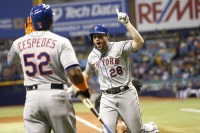What If Murphy Accepted the Qualifying Offer?

Before teams were able to sign free agents, the Mets extended the $15.8 million qualifying offer to Daniel Murphy. We know that if Murphy would’ve accepted the offer, it would’ve prevented the Mets failed pursuit of Ben Zobrist. The Neil Walker–Jon Niese trade doesn’t happen. Murphy accepting the qualifying offer would’ve had greater implications.
During the cost of the offseason, the Mets signed Asdrubal Cabrera ($8.25 million), Jerry Blevins ($4.0 million), Bartolo Colon ($7.25 million), Alejandro De Aza ($5.75 million), Antonio Bastardo ($5.375 million), and, of course, Yoenis Cespedes ($27 million). Between the group of them, they are all being paid a combined $57.625 million in 2016. So right off the bat, the Mets spent this offseason. Therefore, it would not be fair to say Murphy accepting the qualifying offer would’ve prevented the Mets from spending money this offseason.
Yet, it would be fair to say Murphy accepting the qualifying offer would greatly impact how the Mets proceeded with their offseason plans.
First off, the Mets would’ve have to had to address Niese is some fashion. If the Mets kept him, Niese would’ve been owed $9.0 million or $1.75 million more than what the Mets are paying Colon. It’s possible the Mets could’ve kept Niese using him as a fifth starter until Zack Wheeler returned. At that point, he would return to the bullpen where he had success in the postseason last year.
If the Mets were intent on trading Niese, it would’ve been interesting to see what the Mets would’ve received in exchange. Naturally, they wouldn’t have pursued a second baseman. Other than Andrelton Simmons, there wasn’t a shortstop of note who was traded in the offseason. It’s fair to say Niese would have been insufficient as a trade piece to fetch Simmons. Instead, it’s more likely the Mets would’ve pursued a bullpen arm.
In the offseason, the Mets signed Bastardo and Blevins to a combined total of $9.375 million. Judging by how early the Mets signed Blevins, it’s possible the Mets would not have signed Bastardo. Bastardo’s money likely would’ve been allocated to the hypothetical bullpen arm. So, it’s possible the Mets bullpen would’ve looked different had the Mets retained Murphy.
However, the biggest change might’ve been Cespedes. Even without Murphy accepting the qualifying offer, the Mets initial plan in the offseason was to sign De Aza to platoon with Juan Lagares. It’s possible with more money invested than they would’ve otherwise, it’s possible the Mets stop there and don’t add Cespedes. Where Cespedes goes after that would be anyone’s guess.
It’s possible with the Nationals getting shut out on everyone else, they would’ve been in a position to offer a better deal to Cespedes. There may have been a greater sense of urgency too. Also, with the $15.8 million invested in Murphy, it’s likely the Mets wouldn’t have had the money to offer to Cespedes to prevent him from going to the Nationals.
Overall, the only move the Mets made that should not have been impacted was Cabrera. Even with paying Murphy $15.8 million, the Mets still could’ve afforded to spend what they spent on Cabrera. As discussed heretofore, there’s no telling how else the Mets would’ve proceeded. We don’t know what else they would’ve or could’ve done. The one thing everyone can be fairly confident about is Cespedes likely would’ve signed with another team.
While I still maintain that Murphy returning on a reasonable deal would’ve been better than the Walker-Niese trade, Murphy not accepting the qualifying offer was the best thing that happened to the Mets this offseason.